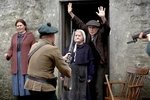A history of an occupation...

George Monibot of The Guardian writes about the reaction to Ken Loach's The Wind That Shakes the Barley, Loach's film about the Irish independence movement in the '20's. Monibot makes the same point that others made about The Battle of Algiers, that a look at local resistance to colonial-style occupation and the brutal way it is put down is instructive in looking at the situation in Iraq.
Monibot writes:
Are these people claiming that events of the kind Loach portrays did not happen? Reprisals by members of the Royal Irish Constabulary and the Auxiliary division are documented by historians of all political stripes. During the period the film covers (1920-21), policemen visited homes in places such as Thurles, Cork, Upperchurch and Galway and shot or bayoneted their unarmed inhabitants. Nor does any historian deny that they fired into crowds or threw grenades or beat people up in the streets or set fire to homes and businesses in Dublin, Cork, Limerick, Bantry, Kilmallock, Balbriggan, Miltown Malbay, Lahinch, Ennistymon, Trim and other towns. Nor can the fact that the constabulary tortured and killed some of its prisoners be seriously disputed.
It is also clear that some of these attacks were sanctioned by senior officers and politicians. In June 1920, in the presence of the commander of the Royal Irish Constabulary, the force's divisional commissioner in Munster (Colonel GB Smyth) told his men: "You may make mistakes occasionally and innocent people may be shot but that cannot be helped ... The more you shoot, the better I will like you, and I assure you no policeman will get in trouble for shooting any man." He advised that "when civilians are seen approaching, shout "Hands up!" Should the order be not immediately obeyed, shoot and shoot with effect. If the persons approaching carry their hands in their pockets, or are in any way suspicious looking, shoot them down." Sir Henry Wilson, the director of operations in the War Office, complained that he had warned his minister - Winston Churchill - that "indiscriminate reprisals will play the devil in Ireland, but he won't listen or agree". There was even a policy of "official reprisals": the homes of people who lived close to the scene of an ambush and had failed to warn the authorities could be legally destroyed.
and further down
The other side - whether it concerns Ireland, India, Kenya or Malaya - is always inadmissable. The torture and killing of the colonised is ignored or excused, while their violent responses to occupation are never forgotten. The only aggressors permitted to exist are those who fight back.read the rest here
Does it matter what people say about a conflict that took place 85 years ago? It does. For the same one-sided story is being told about the occupation of Iraq. The execution of 24 civilians in Haditha allegedly carried out by US marines in November is being discussed as a disgraceful anomaly: the work of a few "bad apples" or "rogue elements". Donald Rumsfeld claims "we know that 99.9% of our forces conduct themselves in an exemplary manner", and most of the press seems to agree. But if it chose to look, it would find evidence of scores of such massacres.
Loach, Pontocorvo and General Nguyen Van Thieu (at least I think it was he- please correct me if I am wrong) all make the point that occupied populations have more at stake precisely because it is their land that they are fighting for, and eventually will, in some form or another, take back their identity, rights and sovereignty.
And that is a lesson the US never learned, not from Vietnam and certainly not from the Pentagon screening the Battle of Algiers.


